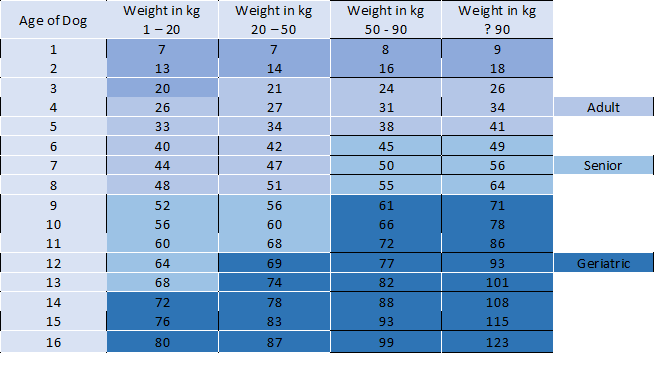Trying to figure out if your older dog requires to move to a senior dog food can be a tough task. The challenge here is knowing when your dog has reached senior status.
Dogs age at different rates, depending on their breed and size. Small breed dogs age much more slowly than large or giant breeds.
Many dogs enter their senior stage of life between seven and nine years of age. That is when dogs start to experience some internal changes, such as decreased activity or slower metabolism, even if they’re not showing outward signs of aging. It is also when dogs begin to develop health issues like senior humans, such as diabetes, heart disease, arthritis, hypothyroidism, kidney disease and others.
How old is your dog in human years?/

Many senior dogs with age-related health concerns can therefore benefit from an appropriate food change.
Even if your senior dog doesn’t have an age-related health concern now, they may still be undergoing physical changes that would benefit from adjusting the food or feeding program
Some dogs tend to gain weight as they age because their metabolism slows, they’re not as active because their joints hurt, or they’ve developed hypothyroidism (an abnormally underactive thyroid). Whatever the reason those extra kilos are adding up, that is probably because your older dog isn’t using as many calories as they are consuming. If weight gain is a concern, some senior dogs’ benefit from eating foods with less fat content. Try Senior Lite.
Weight gain isn’t an issue for all senior canines. As some senior dogs move into the geriatric bracket, they could start losing weight and need more calories and fat than they’re eating. For these older dogs try Speed and Stamina.
Just as in older people, a dog’s appetite can diminish as they age. The reason could be related to a dulled sense of smell, an underlying disease such as kidney disease, or a medication that your dog routinely receives. If you notice your senior dog is eating less than usual, be sure to talk to your veterinarian. Your veterinarian can help determine if your dog’s decreased appetite is a sign of an underlying issue and, if so, recommend an appropriate course of action. But if your dog’s appetite loss is age-related, try topping their food with FourFriends high meat-based sausages. If all else fails speak with your veterinarian.
Dental problems are common with many senior dogs. This can make it difficult for your dog to chew kibble. Consider adding small amounts of warm water to their kibble. This will make it easier for them to eat.
Senior dogs often have more upset stomachs than their adult canine counterparts. That’s because your older dog’s digestive system is less efficient at breaking down foods and absorbing nutrients. Two of the more common digestive upsets seen in older dogs are constipation and increased flatulence. A food with increased fiber can help avoid constipation, while exercise can help move gas through your dog’s digestive system and stimulate bowel movements.
No single diet is right for every dog. We are here to help and answer any questions you may have.